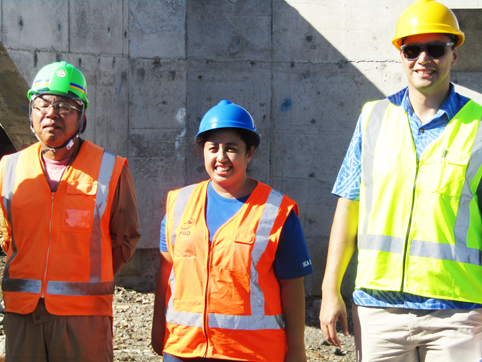By Staff Writer
The Land and Transport Authority lady Chief Executive, Galumalemana Titi Tutuvanu-Schwalger, is fired up by the World Bank push for more women to be involved in the transport sector.
The World Bank is funding a US$66m tala project for the transport sector in Samoa and they want more women involved as part of a gender equity drive.
CEO Galumalemana is one of the rare women who is involved in a sector where not many of her gender are involved but she heads the land and transport sector.
What she believed is special about her gender is they “…provide a woman’s touch.”
“ This is not to say that we are better than men, but rather our strengths complement theirs,” Galumalemana hastened to add.
“ Women do provide a unique perspective and skillset in the engineering profession or any organization as women tend to pay more attention to detail, well organized, manages time and resources well due to our roles as mothers, sisters and daughters at home.
“The ability of our women to attain more of the CEO positions in government is a testament to women’s resilience to overcome challenges we face including discrimination.”
The World Bank funded Samoa Aviation and Roads Investment Project (SARIP) hopes to have more roles for women to help improve the safety and climate resilience in aviation and road sectors that play a critical role in Samoa’s development.
The project is allocating at least 20 per cent of road maintenance and services work to women, as well as supporting a new plan to build female talent across Samoa’s transport sector.
In 2017, only 12.5 per cent of the 2,400 people employed in the sector were women.
Safe, more resilient and reliable transport for Samoa is the goal of the multi-million tala SARIP project to upgrade aviation and road infrastructure and strengthen the travel the local travel industry.
Samoa has been hit by five major tropical cyclones in the past 30 years, with most of its airport terminals and runways, bridges, and roads in coastal areas increasingly at risk to the impacts of sea level rise, storm surges and intense flooding.
This includes extreme weather events in 2018 and 2020 that led to flooding in parts of Faleolo International Airport, resulting in severe disruptions to operations, hence the need for this investment. Combined with Samoa’s high vulnerability to disasters and climate change impacts, is the need for the country’s tourism sector – which represented 24 per cent of the country’s gross domestic product (GDP) in 2019 – to start its long road to recovery from COVID-19 and the 2019’s measles outbreak.
“Samoa’s long-term vision, ‘Samoa 2040’, aims for the country to be a leading tourism destination in the Pacific, with 400,000 arrivals per year by 2040,” said Iretomiwa Olatunji, Acting World Bank Resident Representative for the South Pacific.
“Working in partnership with the Samoan Government, we know that strengthening the resilience and longevity of aviation and road infrastructure is vital to achieving this goal, including growing the economy in other transport reliant sectors that builds on other World Bank transport projects in Samoa and the Pacific.”
“Addressing critical aviation and road infrastructure is essential to strengthening economic resilience in Samoa,” said the Hon. Olo Fiti Afoa Vaai, Samoan Minister of Works, Transport and Infrastructure.
“This project is strongly aligned with our Pathway for the Development of Samoa and the Samoa 2040 vision, and we are pleased to be able to continue our strong partnership with the World Bank; one that has consistently delivered transport infrastructure that is resilient, robust and ultimately ensures that Samoans can get where they need to go, safely.”
The Samoa Aviation and Roads Investment Project, which will be implemented over the next seven years, will provide support for a comprehensive flood risk management strategy and improvements to drainage at the airport and will also provide funding to improve the resilience and safety of critical road sections on Upolu, as well as support for emergency response and reconstruction through its Contingent Emergency Response Component.
In addition, in recognizing that improving transport connectivity has broader regional benefits, the new project will support the Safety of Aviation for Regional Resilience (SOARR) program, which aims to improve the resilience, safety, and asset management of airport infrastructure in Samoa, as well as in Solomon Islands and Tonga.
